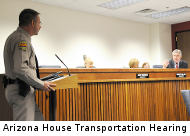1/23/2009
Arizona: Freeway Photo Radar Ban ProceedsArizona state House committee votes to ban photo radar as speed camera documents may have been falsified in up to 1000 cases.

A committee of the Arizona state House of Representatives yesterday voted 5-2 to approve legislation banning the use of speed cameras on freeways. The House Transportation and Infrastructure Committee decided to act in response to a rising tide of public opposition to the largest single deployment of speed cameras ever attempted in the US. State lawmakers voted to reject the program despite the testimony of state police officials that the automated ticketing machines were improving safety on Arizona's highways.
"Arizona Department of Public Safety statistics show on average photo enforcement is saving three lives per month on Valley freeways," a state police press release from December 28 claimed. "Results show 116 fewer injury crashes."
On Thursday, Department of Public Safety (DPS) Commander Thomas Woodward appeared before the panel to repeat these widely reported Phoenix metro area freeway accident statistics. The numbers were based on the first eighty days of freeway ticketing from September 26, 2008 to December 16, 2008 and compared with the same dates in 2007, before the installation of cameras. Woodward gave credit for the drop in accidents entirely to the use of cameras.
TheNewspaper obtained a comparable ninety-day dataset covering accidents on Las Vegas-area freeways between September and November 2007 for comparison with the same dates in 2008 (December data were not available) from the Nevada Highway Patrol. This agency does not use photo radar because state law bans its use under any circumstances (Nevada Revised Statutes 484.910). Using the DPS methodology, one could conclude that this ban on photo radar resulted in 142 fewer injury accidents and an overall drop in collisions of 551.
More likely, however, is that accident statistics reflect a nationwide drop in travel linkd to a slowdown in overall economic activity. When fewer cars are on the road to be involved in accidents, the number of collisions drops. According to the Arizona Department of Transportation, traffic on Maricopa County freeways declined an average of seven percent during the period in question.
Lawmakers at the hearing were concerned with more than just accident statistics. State Representative Andy Biggs (R-Gilbert) was also upset to learn that the Redflex freeway cameras have been recording video twenty-four hours a day to track the movements of drivers not accused of any crime. Last September, TheNewspaper first reported the plan to link all continuously recording photo enforcement cameras into a nationwide surveillance network.
House Bill 2106, endorsed by the committee, would allow such surveillance to continue as long as the cameras used are not deployed on a state highway. Local jurisdictions would remain free to issue tickets and track drivers with these systems. That is why a local group, CameraFraud.com, vows to continue collecting signatures for an initiative that would give voters a chance to ban all forms of photo enforcement on both the state and local level.
If enacted, House Bill 2106 would spell financial trouble for Redflex, the Australian vendor that holds the lucrative contract to operate the freeway ticketing program. Redflex rival American Traffic Solutions (ATS), however, has its own problem yesterday. Tucson courts are expected to throw out up to 1000 tickets after a process server was allegedly caught falsifying documents.
Under Arizona law, motorists cannot be held responsible for an automated ticket that is sent in the mail. Instead, the citation must be hand-delivered by a process server who certifies that the recipient actually received the notice. ATS outsourced this function to E-Z Messenger Legal Support Providers and compensated the company with a bounty for each ticket successfully delivered. E-Z Messenger fired process server Michael Dimenstein after the Tucson Courts uncovered evidence that Dimenstein may have certified tickets as delivered to collect payment even when no attempt was ever made to contact the ticket recipient.
ATS spokesman Josh Weiss was quick to point out that E-Z Messenger is not a "fly-by-night" company and is frequently used by government agencies and attorneys in the area on official court business. Photo enforcement companies around the world are frequently involved in similar legal troubles.
A copy of HB2106 is available in a 25k PDF file at the source link below.


